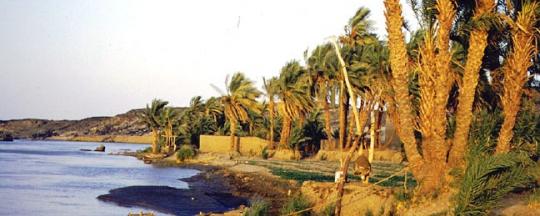Recurrent palm grove fires in northern Sudan can be avoided, says expert

Palm trees along the River Nile in Northern State (File photo: Supplied)
Hardly a month or two goes by without news of palm trees burning to ashes in Sudan’s Northern State. Agricultural expert Daoud Hussein describes the date palm as a “real treasure” and offers solutions for the recurrent wildfires in palm tree groves as well as possibilities of expanding the economic yields of the tree.
These fires cause huge financial losses that are difficult to recover in one or two seasons. Farmers suffer huge financial losses, especially since dates are the mainstay of the economy in Northern State, and the most important source of income for many of its inhabitants.
This year, Northern State witnessed more than 20 fires, most of which were in areas where Mahas* live. The last two incidents occurred last week. The first fire, which broke out on Artagasha Island, north of Argo Island in El Burgeig, resulted in the loss of more than 2,000 fruit-bearing palm trees. The second one was reported from Defawi Island in Delgo which destroyed more than 250 palm trees and more than forty fruit trees.
In the summer, fires in palm tree orchards can be caused by neglect in cleaning the fields and the way waste is disposed of, but the regular recurrences of fires on well-managed farms, cause many to speak about arson.
In former years, activists in the region accused affiliates of the former regime of Omar Al Bashir (1989-2019) of setting palm tree groves on fire in response to the residents’ opposition to the Kajbar and Dal dam projects, which were cancelled in 2021 by the government of Abdalla Hamdok. These accusations were never proven true, and complaints were often filed against unknown persons.
Dangers
In end July, a wildfire on a palm plantation in Delgo destroyed more than 85 date trees. The man who had cleaned the trees of old palm fronds, burned the waste to dispose of it and had not checked if the fire had entirely gone out. The fire brigade was unable to reach the field due to the lack of open roads.
Agricultural expert and former employee of the UN Food and Agriculture Organisation (FAO) Daoud Hussein warns for the dangers of these wildfires for the environment as they will lead to desertification.
Furthermore, “the date stone contains volatile oils that can explode after the date falls to the ground and the temperature become too high,” he told Radio Dabanga yesterday, and added that fires also cause damage to the respiratory system, such as asthma, infections, and others.
‘A real treasure’
The agricultural expert describes the palm tree as a “real treasure”, not only because of its healthy fruits.
“Even the palm fronds and other waste have great economic value. It is used in the pharmaceutical industry but can also successfully be used in the fertiliser industry,” he said, while lamenting both the government’s and the northern Sudanese’s lack of interest in dates and date palms waste.”
According to Hussein, the only solution to address the problem of wildfires at palm plantations is another way of working and cooperation between the palm owners and the government. “The British colonial authorities for instance had established a law obligating farmers to deal with palm trees and clean them of fronds in a specific way.”
“The trees should be replanted following scientific research into the most promising varieties of palms. The government should then remove all existing palms and plant new strains of various types of trees based on this research, in an organised manner and at wide intervals,” he stated.
“This is the best way to reduce the fires and enable fire engines to enter the palm groves”. He expects that these new strains will bear fruit in the near future, within three or four years, noting that the soil and climate in northern Sudan “definitely contribute to the success of these reorganised plantations”.
Reluctant
The agricultural expert believes that Sudanese owners of palm plantations are reluctant to benefit from palm waste, such as old fronds, which no longer have economic value. “The many attempts to convert palm waste into fertilizer failed unfortunately.”
He refers in this context to people living in Gaza, who were able to recycle palm waste and establish a factory to produce paper napkins. “The Palestinians in Gaza managed to develop these new resources, even though they do not own more than 300,000 palms, while the Sudanese own nearly 20 million palm trees.”
Hussein also lamented the mass migration of people from Northern State to Khartoum and abroad, which began decades ago to, as the palm tree orchards did not yield enough anymore to cover the needs of the families.
“And the abandoned palm groves, with weeds and dry trees piled up, can also contribute to a rapid outbreak of fires,” he added.
* The Mahas are a sub-group of the Nubian people living in southern Egypt and northern Sudan along the banks of the River Nile.








 and then
and then